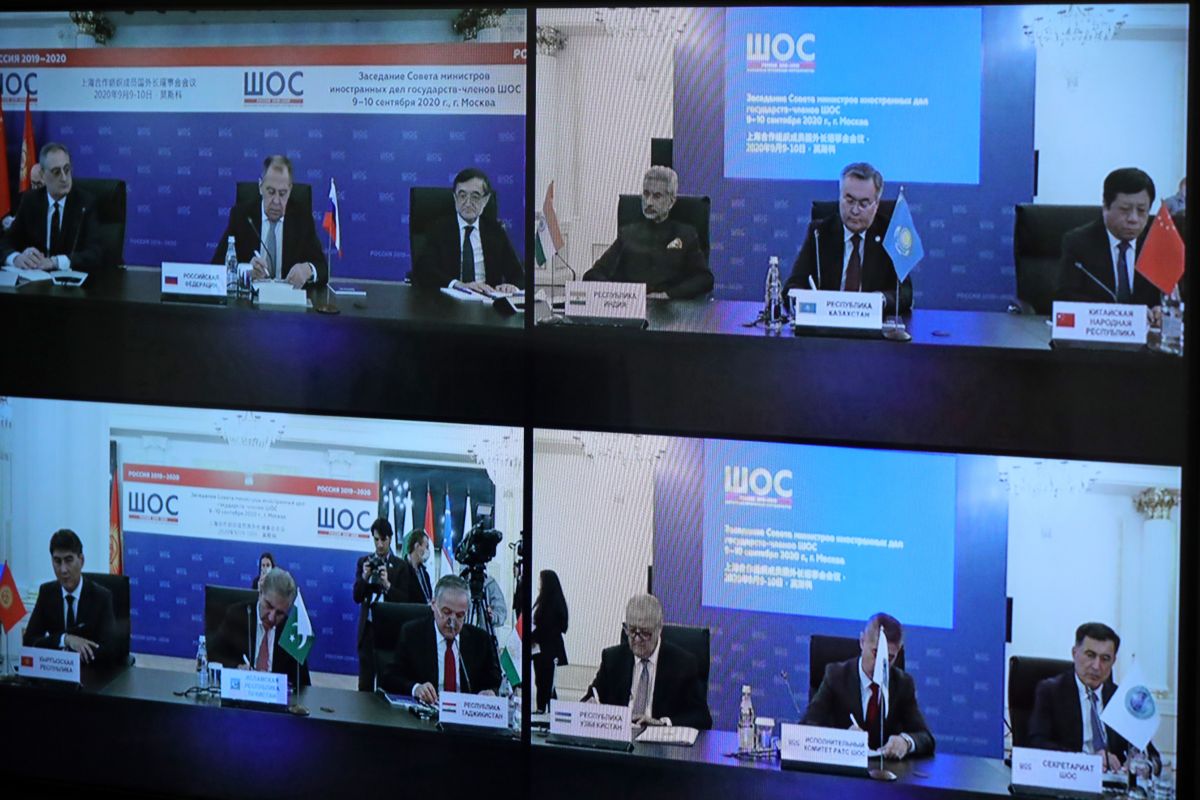The Future Development of the Shanghai Cooperation Organisation
 Fot. Mikhail Klimentyev/TASS
Fot. Mikhail Klimentyev/TASS
The Evolution and Role of the SCO
The organisation was established on the initiative of Russia and China at the 2001 Shanghai Summit with founding members Russia, China, Kazakhstan, Kyrgyzstan, Tajikistan, and Uzbekistan. It replaced the “Shanghai Five”, operating since 1996, which was a non-institutionalised forum for cooperation between these countries (except Uzbekistan). India and Pakistan joined the SCO in 2017. It cooperates with numerous third countries, with Afghanistan, Belarus, Iran, and Mongolia having observer status, while Armenia, Azerbaijan, Cambodia, Nepal, Sri Lanka, and Turkey have the status of “Partners in Dialogue”. Turkmenistan is also a regular participant in SCO summits.
The aims of the organisation are to strengthen regional security—combating terrorism, separatism, and extremism—and intensify political cooperation between the member states. The SCO, which is still known as the “Shanghai Five”, had a positive impact on relieving political tensions between the states of Central Asia, Russia, and China in the 1990s regarding border agreements, anti-terrorist activities, and other areas. However, with the increase of Russian, and then Chinese, involvement in the region in the 21st century, the SCO has transformed into a forum for legitimising Russian military influence and Chinese economic expansion in Central Asia. In practice, the SCO’s main goal, as it is dominated by Russia and China, has become to limit the presence of other external actors in the region, especially the U.S. and the EU, which has meant the organisation has lost its rank as an instrument strengthening regional stability.
The most institutionalised form of cooperation within the SCO involves police and anti-terrorism units, including within the Regional Antiterrorist Structure (RAST). However, the SCO has not been effective in the fight against regional terrorist and criminal groups. Instead it is used to legitimise the political repression carried out by the authoritarian regimes of the member states against their political opponents (among the members of the SCO, only India and Pakistan are recognised by Freedom House as partially free states). This includes China’s actions against the Uighur minority and Tajikistan’s repression of the democratic Islamic opposition.
Despite the SCO’s declared involvement in economic cooperation and the creation of a Business Council and Interbank Consortium, among others, the organisation does not contribute to the deepening of economic ties between its member states. The SCO’s lack of action with respect to the COVID-19 pandemic and its consequences for the economies of the countries in the region additionally weakens the integration potential of the organisation in such areas.
SCO and Central Asian States
Central Asian states use their participation in the SCO mainly for propaganda purposes. They present the organisation’s activity as a manifestation of a multi-vector foreign policy. This is true primarily for Kazakhstan, the first president of which, Nursultan Nazarbayev (who in fact still controls this country), is a promoter of Eurasian integration. In reality, however, the SCO is not a priority for the countries of the region in their foreign policy, nor does it lead to the strengthening of their international position. The organisation lost its importance in resolving regional conflicts, as evidenced, among others, by its non-involvement in resolving the Sino-Indian clashes in June 2020, the Kyrgyz-Tajik clashes in April this year, and its lack of a strategy towards the situation in Afghanistan.
The states of Central Asia, striving to strengthen their position in relations with Russia and China, are creating other, regional forms of cooperation as alternatives to the SCO, as it pursues primarily Russian and Chinese interests. This process accelerated after 2016 when, as a result of the change of government, Uzbekistan made the deepening of ties between the countries of the region a priority of its foreign policy. Country-initiated consultation summits with the participation of five Central Asian countries have been held regularly since 2018, followed by intensification of cooperation at lower levels. This creates a competitive political structure vis-à-vis the SCO, limiting its regional significance.
SCO and Russia-China Relations in Central Asia. The goals of China’s and Russia’s policy on regional security in Central Asia are similar. Both countries primarily strive to maintain stability in the region and limit the activity of other external actors, particularly the U.S. and the EU. The organisation, however, does not play a coordinating role in Russian-Chinese relations and their policy towards Central Asia. Both countries have developed their own instruments for influencing the situation in the region, but which are not complementary to the SCO. Russia uses bilateral relations and the structures of Eurasian integration it controls—the Eurasian Economic Union and the Collective Security Treaty Organisation to implement its regional policy. For China, the SCO is also not a priority instrument in its policy towards Central Asia. China considers bilateral economic cooperation under the Belt and Road Initiative to be the basis of its relations with the countries of the region.
Conclusions and Perspectives
Although at the beginning of the SCO, it was an important platform for political dialogue in Central Asia, with the passage of time and the increase in the number of members, the organisation lost its ability to react to regional conflicts and security challenges. The SCO today is not contributing to increasing the stability of the region, nor is it conducive to the intensification of multilateral cooperation. The organisation is dominated by Russia and China and is primarily used to pursue their interests in the region. The SCO members will not seek to deepen integration within the organisation, but rather to further expand the number of participants. In the members’ opinion, this is to increase the prestige and propaganda significance of the SCO as a forum for dialogue involving countries outside Central Asia. Moreover, expanding the group of members of the organisation is, in the perception of both Russia and China, an additional instrument for strengthening their influence in the region. Both countries can use it in the future, for example, by attempting to mediate the India-Pakistan conflict or by developing pragmatic relations with the new government of Afghanistan.
In the future, Iran, Turkey, or Mongolia may be interested in establishing closer cooperation with the SCO because, despite its institutional weakness, may be used for propaganda purposes or in bilateral relations with Russia, China, or individual Central Asian states. The Secretary of the Supreme National Security Council of Iran, Ali Shamkhani, stated in August this year that Iran was ready to join the SCO (the next summit on 16-17 September this year will be devoted to its membership). Turkey is interested in greater cooperation with Central Asian states in the field of security, participation in Chinese infrastructure projects in the region, and is also looking for further platforms for political dialogue with Russia. On the other hand, Mongolia, in the government’s strategy “Mongolia 2050”, provided for greater involvement in the initiatives of regional economic cooperation. However, the potential expansion of the SCO will not increase the role of the organisation in resolving conflicts between its members (e.g., between Kyrgyzstan and Tajikistan), or more effectively counteract threats to regional security (such as the activities of terrorist groups in Central Asia). The SCO also will not be able to work out a common position to counter the destabilisation of Afghanistan because of the divergent interests of its members in this matter (especially in India and Pakistan).


